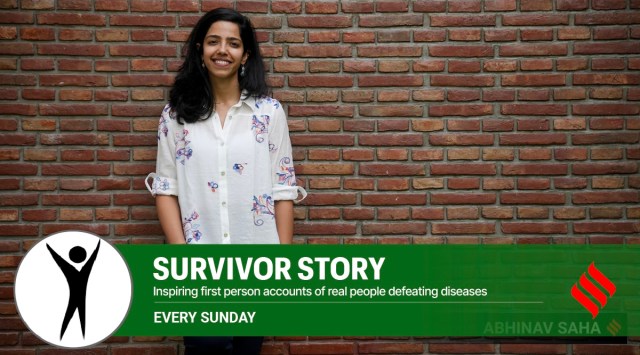Battling anorexia for 8 years, because she had a mortal fear of looking fat, this 29-year-old is now counsellor
Anorexia is self-induced starvation. Patients are preoccupied by their body rather than emotional stability. Social media likes, desirability quotient, non-acceptance as a child, a lack of human engagement, the reasons are many. Consequently, the relationship with food becomes an issue,' says Dr Shalini Naik, Assistant Professor of Psychiatry, PGI, Chandigarh
 Kamakshi, at her residence in Gurgaon (Express photo by Abhinav Saha)
Kamakshi, at her residence in Gurgaon (Express photo by Abhinav Saha)“Thank God, Ed doesn’t talk to me anymore,” says 29-year-old Kamakshi Malhotra, who had once lived in denial of food and drew comfort from her eating disorder, for which she conjured an acronym called Ed, an imaginary voice in her head that ruled her choices and convinced her that food was her enemy. Obsessed with extreme body consciousness and a mortal fear of looking “fat,” she starved herself despite being hungry and developed anorexia, an eating disorder that made her spit out even her morning cookie, progressively emaciated her and consumed her mind. She lost 25 kg, clumps of hair and looked ill. But it was when she was on the verge of a heart condition that she pulled back to reclaim her life. Today, she runs a non-profit organisation to counsel people and get them out of a mental trough of their own making.
Kamakshi grew up in a close-knit, Punjabi middle-class family in Delhi, where she was taught that food on the plate was to be respected and not wasted. An active, energetic and confident 17-year-old in 2011, trouble began when she went to the US to study chemical engineering. “There was a performance pressure that I had never felt before. With 24/7 access to fast food on the campus, who would think of cooking a healthy meal for oneself? Then one day my roommate posted a photo of me eating pizza on social media with the caption, ‘Eat fatty eat.’ In a matter of hours, I had 50 notifications on my phone, with friends and peers poking fun at me, body-shaming me in a mean way. That’s the time I retreated into my shell and vowed not to emerge till I looked just right. I let my self-esteem be guided by the validation of others,” recalls Kamakshi, who now lives and works between Delhi and San Francisco.
Then began a long battle with food, body image, emotional and mental stress. Kamakshi joined a gym, worked out more and more, ate lesser and lesser every day. “If I wanted to eat a little more than what I had on my plate, I told myself I would lose all the progress I had made. Guilt-ridden, I worked out even more furiously the next day. This obsession to drop weight got to a point where I could not relate to my friends. Normal life took a backseat,” says she. The worst mistake she made was to decide what not to eat from social media posts instead of seeking a nutritionist’s advice on losing weight in a planned manner. “I started losing my hair, my skin lost its shine, it became flaky and dry. I lost about 25 kg in three months and as my body started caving in, I started taking vitamins to replenish nutrients. I started falling sick frequently,” says Kamakshi. It was during a consultation for flu medication at the campus health centre that the doctor realized how Kamakshi had drastically lost weight from the time she had enrolled. The data in the system red flagged her sudden variation in health parameters. The doctor referred her to the psychiatrist, who got Kamakshi to talk about her insecurities. “I remember bursting into tears as she said that the real problem stemmed from my mental depression brought on by the way others saw my body, not the way I should have valued it. She asked me to talk about this with someone I trusted. I was apprehensive about telling my parents and shared my predicament with my younger brother. It felt like a great burden had been lifted from my soul,” says she.
She went back to the health centre, where a general practitioner (GP) drew up a recovery protocol that included interventions by a psychologist, psychiatrist and nutritionist, being part of a support group and weekly reviews by a doctor. While talking helped, Kamakshi still wasn’t convinced about eating what was recommended. Instead, she lied to them, drinking water and wearing extra clothes before her weight was checked on the scales. “Once the doctor checked my weight with just my undergarments on. I was so underweight that she told me my heart was at risk and as per law, reported my anorexia to the dean. I had to drop out of college,” says Kamakshi.
Dr Shalini Naik, Assistant Professor of Psychiatry, PGI, Chandigarh, says that of all eating disorders, anorexia, characterised by self-induced malnutrition, has a high suicidal risk. “Patients are preoccupied by their body rather than emotional stability. Social media likes, desirability quotient, non-acceptance as a child, a lack of human engagement, the reasons are many. Consequently, the relationship with food becomes an issue. A normal BMI for an adult is 18.5-24.9 Kg/m2. Adults with anorexia have a BMI below 17.5 Kg/m2 and yet they perceive themselves as being overweight,” she says. “Patients usually exercise too much, do not eat, take laxatives or vomit by scratching the back of their throat and take appetite-suppressants,” she adds.
A visit back home for a wedding in 2012 meant Kamakshi had to face her parents. Her mother decided to get her back on track and moved to the US. The recovery was worse than Kamakshi had expected. As soon as her weight increased as part of her rehabilitation, she cheated her nutritionists and relapsed. “The silver lining to all this was that I realised what it felt like to feel healthy. So, after many rounds of back and forth, it became easier to get back to my recovery plan. This lasted two years,” she says.
The psychiatrist played a crucial role, working on her body insecurities and teaching her mind control. However, so dependent had Kamakshi become on her guide that she had a major relapse when she moved back to Delhi after graduation in 2015. Given the trust factor, she went for long-distance counselling and set achievable targets. “I remember the day I went to a restaurant guilt-free or the day I stopped counting calories. My recovery took eight years, three years to be medically fit and five years to reclaim my mind and be body-positive. I’m more intuitive about my body and I understand it better than I ever did. I remember what it was like not to respond to those cues and so don’t go down that path anymore,” says Kamakshi.
Now leading a support group, she says the challenge for patients of eating disorders is diagnosis. “Few doctors understand anorexia but eating disorders that don’t drive you to the ER are ignored,” says Kamakshi, who moved to France in 2020 for her MBA and analysed various kinds of eating disorders. Her group, Freed, provides an ecosystem of support, accessible resources and a helpline where youngsters between the ages of 9 and 13 are seeking help. “They shouldn’t let in another voice in their heads,” she says.






- 01
- 02
- 03
- 04
- 05

























